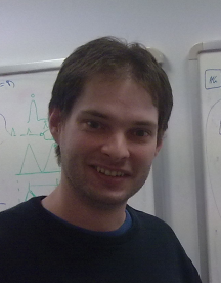Principal Investigator: Dr. Bernhard Schrenk
 Dr. Bernhard Schrenk was born 1982 in Austria and received the BSc ('05) and MSc ('07) degree in microelectronics from the Technical University of Vienna. At the Institute of Experimental Physics of Prof. Zeilinger, Univ. of Vienna, he was involved in the realization of a first commercial prototype for a quantum cryptography system based on polarization entanglement, within the European FP6 SECOQC project. His MSc thesis on a fibre transmission stabilisation system for a polarisation entangled quantum key distribution received recognition through the Austrian OVE and INiTS awards.
Dr. Bernhard Schrenk was born 1982 in Austria and received the BSc ('05) and MSc ('07) degree in microelectronics from the Technical University of Vienna. At the Institute of Experimental Physics of Prof. Zeilinger, Univ. of Vienna, he was involved in the realization of a first commercial prototype for a quantum cryptography system based on polarization entanglement, within the European FP6 SECOQC project. His MSc thesis on a fibre transmission stabilisation system for a polarisation entangled quantum key distribution received recognition through the Austrian OVE and INiTS awards.
From 2007 to 2011 he obtained his PhD degree at UPC BarcelonaTech, Spain. His PhD work focused on multifunctional optical network units for next-generation Fibre-to-the-Home. Within the FP7 SARDANA and EURO-FOS projects several scientific mobility actions have been performed with the support of the Spanish MICINN FPU scholarship, including a field trial of a WDM/TDM access network in Lannion, France. Dr. Schrenk was awarded with the Photonics21 Student Innovation Award and the Euro-Fos Student Research Award for his PhD thesis, honouring not only his R&D work but also its relevance for the photonics industry.
He joined the Photonic Communications Research Laboratory at NTUA, Athens in May 2011 as post-doctoral researcher and established his research activities on coherent FTTH under the umbrella of the FP7 GALACTICO project.
In February 2013, he established his own research force on photonic communcations at AIT, Vienna, where he is working towards next-generation metro-access networks and photonics integration technologies for telecom applications. The Marie Curie CIG grant will fruitfully support these activities through the WARP-5 project.
Dr. Schrenk's research interests include next-generation passive optical FTTx for long reach metro-access networks, coherent optical communications and optoelectronic integration technology. He is author and co-author of 20 peer-reviewed articles in prestigious IEEE and OSA journals and 50 publications in international top-level congresses. Further, he holds 4 patents in the field of optical communications. Besides German as mother tongue, he is an excellent English language speaker and speaks also some Spanish and Greek.
Co-Workers:
Dr. Christoph Pacher received the MSc and PhD degree in electrical engineering / computer from the TU Vienna. In 2004 he joined AIT and developed and implemented novel mathematical methods for the simulation of opto-electronic components. During his participation in the EU IP SECOQC he developed and implemented error-correction and privacy amplification algorithms for quantum key distribution. Since 2010 he has been working on high-performance algorithms for next-generation quantum communication systems such as forward error correction based on LDPC codes, universal hashing, randomness extraction, and estimation of Hamming distance based on linear codes, on security proofs of QKD protocols and on the design and modelling of coherent quantum receivers.
Dr. Andreas Poppe is Senior Scientist at AIT’s Optical Quantum Technology group and has more than 18 years of experience in experimental work in the field of nonlinear and quantum optics. Scientifically, his main achievements are the first demonstrations of sub-10-fs laser pulses with stabilized carrier-envelope phase ever and the first QKD-secured bank wire transfer. Since 2003 he has been working in the field of quantum optics with entangled photons, including the EU SECOQC IP. Since 2012 his focus includes the integration of quantum-optic systems and concepts in telecommunication networks and the subsystems thereof.
Dr. Thomas Zemen received the Dipl.-Ing. degree (with distinction) in electrical engineering in 1998, the doctoral degree (with distinction) in 2004 and the Venia Docendi (Habilitation) for "Mobile Communications" in 2013, all from Vienna University of Technology. Since 2014 Thomas Zemen has been Senior Scientist at AIT Austrian Institute of Technology. From 2003 to 2014 he was with FTW Forschungszentrum Telekommunikation Wien and Head of the "Signal and Information Processing" department since 2008. From 1998 to 2003 Thomas Zemen worked as Hardware Engineer and Project Manager for the Radio Communication Devices Department, Siemens Austria. He is the author or coauthor of four books chapters, 23 journal papers and more than 70 conference communications. His research interests focuses on ultra-reliable, low-latency wireless machine-to-machine communications for sensor and actuator networks, vehicular channel measurements and modeling, time-variant channel estimation, cooperative communication systems and interference management. Dr. Zemen is docent at the Vienna University of Technology and serves as Associate Editor for the IEEE Transactions on Wireless Communications.